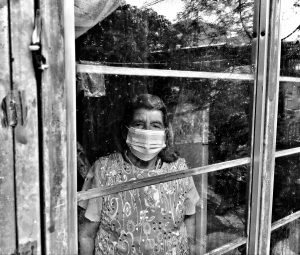Contributed by Sarah Willen & Heather Wurtz
Now is a crucial moment to reflect on our experiences of COVID-19 over the past three years and discuss lessons that we, as a global society, can learn as we strive for a better future. These are central objectives of the Pandemic Journaling Project (PJP) — a combined research study and online journaling platform that was created to chronicle ordinary people’s everyday experiences at the height of the pandemic. Today, PJP focuses on elevating those voices and experiences to deepen our understanding of the pandemic’s lasting impact on the world and to generate dialogue and reflection about what we have both lost and learned during Covid-19 — and what we have yet to overcome.
PJP was created in the spring of 2020 by two medical anthropologists, Sarah S. Willen at UConn and Katherine A. Mason at Brown University, with support from an interdisciplinary team of students and faculty at both institutions. For two years (May 2020-May 2022), people around the world created weekly records of their pandemic experiences — in English or Spanish — in their choice of text, audio, and/or photographs, using only their smartphone or other device.

Since PJP launched, El Instituto (ELIN) support has been vital, and our team has continued to pursue new opportunities for engagement and exchange in Latin America as well as Latinx communities here in the U.S. For instance, we are disseminating our scholarly findings in Spanish and Portuguese. Our written interview with PJP creators (SSW & KAM) about PJP’s human rights implications appeared in the Journal of Human Rights (in English), then in the Portuguese journal Metaxy, and a Spanish version is forthcoming in Estudios Sociológicos. Two papers on an ELIN-supported spin-off study of COVID-19’s impact on Mexican college students are in process: a chapter for a Spanish volume about the “future after Covid-19,” spearheaded by an interdisciplinary group from El Colegio de México (COLMEX), and an article for a special issue about students’ experiences of COVID-19 across the globe.
PJP has also teamed up with community partners in Mexico on several projects engaging youth, students, and the broader community. This includes a five-chapter podcast spearheaded by a youth advocate in Mexico City featuring youth testimonies, photos, and music — the culmination of a four-week project of journaling and psychosocial support (i.e., active listening and guided conversation) with trained professionals. In addition, PJP has joined forces with the widely respected Center for Gender Studies at El Colegio de México, A.C. (CEG-COLMEX) to bring PJP’s multimedia traveling exhibition, Picturing the Pandemic: Images from the Pandemic Journaling Project, to Mexico City, in conversation with images from COLMEX students, faculty, and staff (May 9-June 6, 2023; Spanish site here). Picturing the Pandemic fosters equity and inclusion by displaying creative expressions from ordinary people from across the Americas, and around the world, through both narrative and art-making. It aims to redefine elite spaces to welcome underrepresented voices and aesthetics, and to elevate diverse Latinx perspectives while also creating opportunities for intercultural exchange.
On PJP’s website, we declare: “Usually, history is written only by the powerful. When the history of COVID-19 is written, let’s make sure that doesn’t happen.” As these activities — some sponsored directly by ELIN — make clear, elevating Spanish-speaking and Latin-American perspectives is crucial to this mission.
Sarah Willen is an Associate Professor of Anthropology at UConn and Co-Founder, together with Katherine A. Mason, of the Pandemic Journaling Project (PJP). Heather Wurtz is a Postdoctoral Research Fellow with PJP, with a joint appointment in Human Rights and Anthropology at UConn and the Population Studies and Training Center at Brown University.